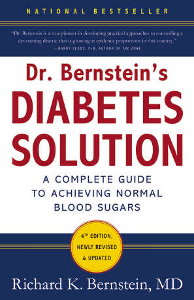- Why Is Dr Richard Bernstein Called The Low Carb Taliban?
- Does Adrian Have Diabetes? The Unexpected Diagnosis During An Interview
- How Does Stress Affect Blood Sugar? A World Diabetes Expert Answers
Full Interview Audio
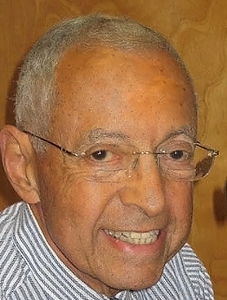
Personal Info
Hobbies and Interests:Singing basso, photography, astrophotography of solar eclipses
Favourite Books:
- The Hobbit by J.R.R. Tolkien
- The World of Null A by A. E. Van Vogt
- The Lion and Albert and Other Marriott Monologues (BBC Radio Collection) by Edgar Marriott
Most Influenced By: Nathaniel Hawthorn Stevens, Heinz Lippman, Albert Korzybski
Facebook: https://www.facebook.com/r.k.bernstein
LinkedIn: http://www.linkedin.com/pub/richard-k-bernstein-md/42/32a/b11
Website: http://www.diabetes-book.com/
Relevant Link: http://www.diabetes911.net/
Interview Highlights
This is a condensed, lightly edited transcript of an audio interview. The full audio is available and highly recommended.
Adrian Bye: Today I’m here with Dr. Richard K. Bernstein. Dr. Bernstein was diagnosed with type 1 diabetes in 1946. He is probably the only person in the world who can say that he saved his own life by figuring out what to eat. He’s been a pioneer in terms of diabetes and I don’t think I’m exaggerating by saying that Dr. Bernstein deserves to win a Nobel Prize for his work in diabetes. Unfortunately, it’s been completely ignored by the mainstream establishment. Dr. Bernstein figured out essentially a lot of what we call a Paleo diet, except Paleo has fruit. He figured it out in 1970 by testing his blood glucose. Dr. Bernstein, thanks for your work over the years and thanks for joining us.
Richard Bernstein: Glad to be with you, Adrian.
Adrian Bye: Do you want to tell us a little bit about your story?
Richard Bernstein: I was a type 1 diabetic diagnosed in 1946 and I was within less than ten years of dying of the consequences of this disease, including advanced kidney disease. Back in those days we had no way of knowing what our blood sugars were at any given time. So I would have frequent blackouts from low blood sugars. I would also have very high blood sugars. I wanted to be a physicist and was taking graduate courses in mathematics at Columbia. I didn’t know that I was hypothyroid in addition to being diabetic, and I used to sleep through my classes. I used to miss classes because I didn’t wake up in the morning. I had a B minus average in college. I couldn’t remember things; there is dementia associated with hypothyroidism. So I decided to switch from physics to engineering which required less intellectual ability. I started engineering school and in the first semester got terrible grades. Then one of my doctors got the idea that I was hypothyroid and had me tested. In those days the test was to put you in a box and measure your respiration rate. Mine was the lowest anyone ever saw. They put me on thyroid replacement and I woke up and got straight A’s and ended up in the Engineering Honor Society. If only I had known that when I was in college, I would have been a physicist.
Adrian Bye: Yeah, but you wouldn’t have done as much interesting work.
Richard Bernstein: Probably. I wouldn’t have ended up working as an engineer for a company that made medical equipment and wouldn’t have discovered blood sugar self-monitoring.
Adrian Bye: And you’d be dead.
Richard Bernstein: In those days, type 1 diabetes was given thirty years from the time of diagnosis. So by 1976 I probably would have been dead.
Adrian Bye: That’s forty years ago that you should have been dead.
Richard Bernstein: Yes. So it’s good that I ended up where I ended up.
Adrian Bye: That was just by virtue of the fact that you were working at a medical instruments company and you were a type 1 diabetic that you stumbled upon this theme basically?
Richard Bernstein: There was an ad in a journal called Lab World. It was the trade journal for our company because we sold medical laboratory equipment. It was my job to develop this equipment; in fact, some of the equipment I developed fifty years ago is still being marketed. One of the products is called Sedi-Stain which is used to stain urine for examination under the microscope. Another one is called the Readacrit Microhematocrit Centrifuge, and that was sort of a breakthrough in the field of measuring the hematocrit, which is the percentage of red cells in the blood. I ended up at the Albert Einstein College of Medicine working in the Peripheral Vascular Disease Clinic. My chief was the world’s authority on the diabetic food, and when he retired from private practice, he gave me his centrifuge, which was the one that I had developed. I have a patent on the calibrated capillary tube that it uses, called the PRE-CAL Tube.
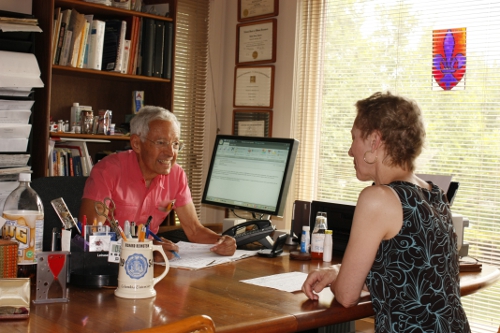
Adrian Bye: You figured out about testing your blood glucose. You started to stabilize it a bit but you didn’t realize how important stabilizing it was. Later you really got into it and figured out how to stabilize your blood sugar and it made a major impact on your life.
Richard Bernstein: Initially, I just wanted to avoid hyperglycemia. Knowing that I had advanced kidney disease and other problems, it was actually my father who thought that maybe getting exercise on a regular basis would stop or prevent the complications of diabetes.
Adrian Bye: How did he come up with that?
Richard Bernstein: My doctor had a patient named Billy Talbert, a world famous tennis player. He was a type 1 diabetic. I ended up meeting him. He was once on display at a major department store and I went up there to see how he looked. He was almost blind, but he was in his fifties by then. So I thought my father’s suggestion was reasonable. But it wasn’t correct. Exercise is good for anyone but it’s not gonna prevent the complications of diabetes. I ordered a literature search at the local medical library. They passed it on to the Library of Congress. There was one thing that they came up with: Exercise did not prevent complications of diabetes. They did point out that it lowered serum triglyceride. We didn’t have HDL in those days, but we knew about triglyceride. They came up with the fact that in animals, if you normalized blood sugar, you prevented and even reversed the complications of diabetes. And one complication that was very obviously reversible was diabetic kidney disease.
Adrian Bye: Which you had.
Richard Bernstein: Which I had. I therefore set about to being more aggressive at attempting to normalize my blood sugars. One thing that became rapidly apparent as I did little experiments on myself was that with a high carbohydrate diet that my physician recommended for diabetics, and is still being recommended for diabetics, there was no way I could control my blood sugars. I came up with what I called the laws of small numbers, which was if you had small amounts of carbohydrate you needed only small doses of insulin. In other words, if you behaved like you were a physiologic human pancreas making tiny amounts of insulin on an as-needed basis, you would be doing something much more physiologic, whereas the American Diabetes Association is still recommending mega doses of insulin to cover the mega doses of carbohydrates. I could not make that work, whereas when I dealt with tiny amounts of insulin and tiny amounts of carbohydrates I could keep my blood sugar essentially normal. Since I couldn’t get my discoveries published as a lay person I went to medical school at age 45 and have since published nine books and many articles.
Adrian Bye: But the American Diabetes Association is starting to come around to your view, are they not?
Richard Bernstein: Yes and no. In November of 2012 they did a mega analysis of literature. They looked at many studies that were made upon diets for diabetics and they came to the conclusion that the only diet that both helped blood sugar and cardiac risk factors – they have always been interesting cardiac risk factors like LDL and HDL and things like that – was a low carbohydrate diet. “But of course we cannot recommend that because we don’t know the long term effects.” Now, of course, the long term effects were known because for the bulk of human history dietary carbohydrates, certainly rapid acting dietary carbohydrates, were not available. And everyone knew that. But there was one fact that they neglected to mention. It was pointed out to me about six months ago by a very well-known researcher in the field of diabetes, who is type 1 diabetic himself. He said you totally missed the point that the bulk of the income of the American Diabetes Association is through the advertising in their journals. And if they were to advocate low carbohydrate diets the bulk of the products that they advertise would no longer be used, or would be used only sparsely. In other words, a low carbohydrate diet would be a very good substitute for many of the medications that the ADA is making money of through their advertising. They recently received a large sum to recommend Domino Sugar mixed with Stevia as a “sugar substitute” for diabetics.
Adrian Bye: In one of your transcripts it made me very sad to see you are talking in front of a group of doctors explaining this, and one of the doctors raises his hands and says, who’s gonna pay for this?
Richard Bernstein: That was the wisest question that was ever asked. It was actually a diabetes educator that asked the question. Who is going to sit down with diabetic patients and teach them how to do all the things I advocate in my books? Whoever pays for it, it’s a lot cheaper than paying for the long-term complications of the disease; the amputations, the kidney transplants, the work on diabetic eyes, etc. The effects of high blood sugar work across the board to affect every tissue of the body.
Adrian Bye: Right. That was actually one of the things I wanted to ask you. I did an interview with Dr. Thomas Seyfried, who is in Boston College. He’s been looking a lot into whether cancer is actually a metabolic condition caused by essentially high blood sugar. What are your thoughts on that?
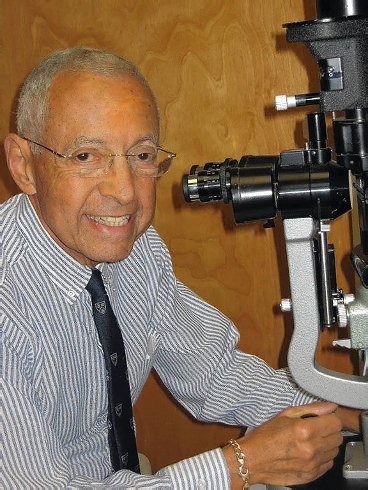
Richard Bernstein: I have published a paper jointly with the immunology department of the Albert Einstein College of Medicine. They presented it at an annual meeting of the Association of Allergy and Immunology, and their abstract got published amongst fifteen hundred other abstracts in the annual meeting journal. I had discovered when that was published, that about 19 percent of diabetics had an immunodeficiency disorder, called CVID, Common Variable Immune Deficiency. Initially, I was testing people who in an initial interview complained about chronic sinusitis. I switched over to testing every new patient and we ended up with twenty-five percent of them having this immune deficiency disorder. Now, if you were to do a literature search on CVID, you’ll find that it predisposes very strongly to malignancies; most commonly blood born malignancies like leukemia and lymphoma, but also to malignancies in general.
Adrian Bye: You scare me because I have sinusitis; my father died of pancreatic cancer and was pre diabetic. Is this treatable?
Richard Bernstein: Yes, it is. It’s treatable with intravenous gamma globulin, which replaces the missing globulins that protect you from cancers and infections. Now, it’s unfortunate that we had to publish in the annual meeting bulletin of a journal that is not read by diabetologists or internists. So it’s still a secret even though we published it. I’m constantly running into problems that people are experiencing because they have CVID. I’m trying to get this published in diabetic journals and I can’t get it published.
Adrian Bye: So you are a black sheep.
Richard Bernstein: Yes, I’m the enemy.
Adrian Bye: You are also called the Low Carb Taliban.
Richard Bernstein: Yes, that’s right. The people who are making money off of diabetes hate anybody who advocates normal blood sugars and who shows how normal blood sugars can be achieved. There are all kinds of things that I have discovered that I can’t get published because the authorities are not interested in them. And then there is the fact that I’m considered the enemy by the publishers associated with the American Diabetes Association, so they usually won’t accept anything I submit.
Adrian Bye: Have you been publishing all of this? You are eighty now, aren’t you?
Richard Bernstein: Well, yeah, I’ll be eighty in June. I have these monthly free teleconferences where in addition to answering questions that listeners submit I try every month to have extra subjects that no one asks about that I think are important. That’s how I leak out these interesting tidbits that are very important and have been turned down by the medical establishment.
Adrian Bye: I wanna ask you a question on stress. I read this in your books, and I’ve tested this myself, that stress does not raise your blood glucose. But you say that it sometimes does and sometimes it doesn’t.
Richard Bernstein: When I was thirteen years old no one could understand why I was getting over two hundred units of insulin a day, which is about twenty times what a kid my size makes. It was because I was on this high carbohydrate diet. I was living on almost only carbohydrates because they thought this would prevent heart disease. They still have that myth even though they are killing people right and left. They sent me to the Joslin Clinic, which was then run by Elliott P. Joselin, who was a lot more of a believer in normal blood sugars than the current people in Boston seem to be. I attended lectures which were given for adults, and I only remember one thing that he taught: “never run a block for a bus, run a mile.” His point was that you make counter-regulatory hormones, called stress hormones, that are gonna raise your blood sugar and you won’t get enough exercise to get the blood sugar down if you only run a block. Now, I have plenty of patients when they speak in public, let’s say they are teachers, performers or singers, their blood sugars go up. I even have kids if they have an important soccer game their blood sugars go up. So stress does raise blood sugar if you are a diabetic.
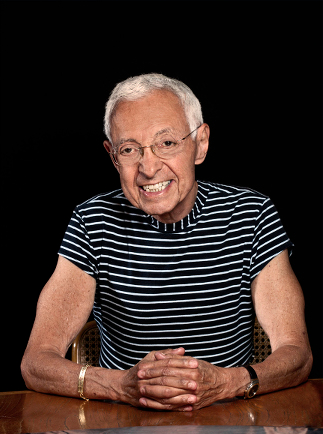
Adrian Bye: Is this for type 1 diabetic?
Richard Bernstein: It could be for any diabetic. But exercise will not necessarily raise blood sugar. In fact, it may lower blood sugar if it is very strenuous and concentrated. When I go to the gym I do such intensive exercise, some people call it the slow burn, that I have to check my blood sugar after every two exercises. I would usually drop every two exercises by ten milligrams per deciliter, and I have to drink liquid glucose every two exercises or I won’t be able to do a decent workout. So certain kinds of physical stress, that’s exercise, if concentrated, can lower blood sugar dramatically; and other kinds of exercise, like getting into a fight with your spouse, or public speaking or what not, can raise your blood sugar if you’re diabetic. You do have a father with a bad history and it might be wise to look at your hemoglobin A1C, which is a test of your average blood sugar of the last few months
Adrian Bye: 5.5
Richard Bernstein: Well, unfortunately, that’s elevated. That’s a blood sugar of about 120. And normal is around 83. So you are about fifty percent above normal.
Adrian Bye: Go on, say it, you want to diagnose me as diabetic on this call, don’t you?
Richard Bernstein: You see, I tend to be much more aggressive. I have a patient that is diabetic. He is sixteen years old. We just tested his mother and she is 5.6. So she’s got a higher A1C than he because he’s been treated. He has two siblings, and they are both around 5.3. Something has to be done for all of them. They should all be on low carbohydrate diets, they should all be exercising, and if their A1Cs don’t come down to to let’s say 4.2 to 4.6, they should have some mild oral agents that are benign. In fact one of the oral agents, Metformin, is actually now being used experimentally to fight cancer because they discovered by accident that it fights cancer.
Adrian Bye: A1C is an average glucose level over a three months period. It may turn out to be the single most important data point to evaluate your health. So you wanna check your A1C and I would follow what our friend here, the Low Carb Taliban, says: You want to be between 4.2 and 4.6., and you can hear on this call I’m potentially getting diagnosed myself with prediabetes.
Dr. Bernstein, thank you for the interview, thank you for all of your work.
Dr. Bernstein: For more information you might read my 2011 book DIABETES Solution, which has a five star rating at <amazon.com> and listen to my free teleseminars at <askdrbernstein.net>



